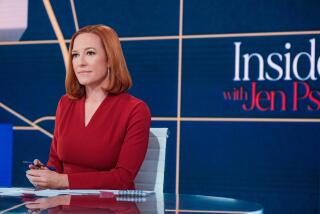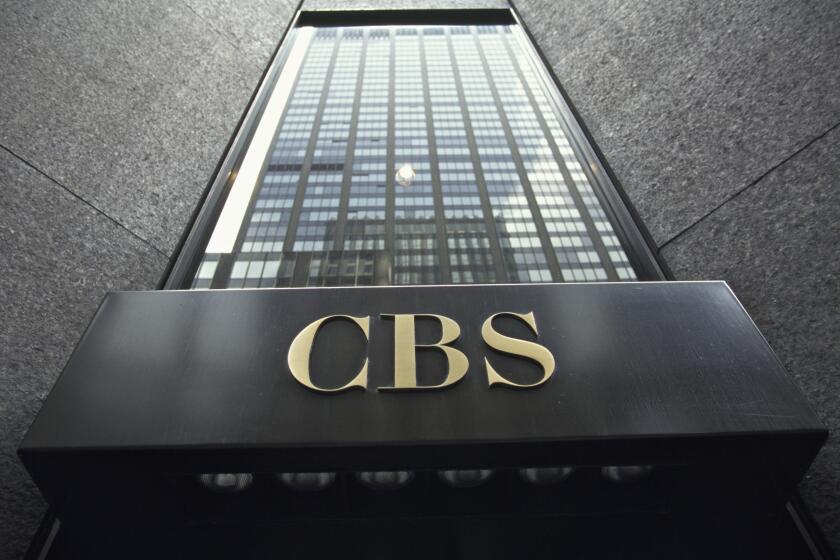This TV Host Lets Leading Thinkers Say Their Peace
- Share via
How a high-minded television program manages to survive week after week in a medium notable for its trivialization of reasoned public discourse has to be one of the great mysteries.
But every Sunday morning on KOCE-TV Channel 50, which broadcasts from Huntington Beach, “Quest for Peace” host John M. Whiteley goes up against the likes of PGA golf, NBA basketball, preseason baseball, old movies and kiddie cartoons. And he does it without the help of car crashes, drug busts, sex, gossip or the rest of the tube’s common currency.
“Do you see these?” Whiteley asked in a recent interview, pointing to clusters of red and blue pins scattered all over a wall map of the United States in his office at UC Irvine. “Each pin,” he said, “represents a place where the program is seen. We’re in every major metropolitan area in the country.”
According to Whiteley, a professor of social ecology, “Quest for Peace” is broadcast in more than 200 markets on cable and local PBS stations. The chief reason for the program’s survival, he believes, is that nothing else on television provides discussions that are as wide-ranging or in-depth about “the most significant issue of our time.”
Unless you count Dr. Strangelove, there probably isn’t a technical expert of note whose opinion on the peace process Whiteley hasn’t sought--from nuclear scientist Edward Teller, the father of the H-bomb, to civil libertarian Norman Cousins; from physicist Hans Bethe, a Nobel Prize winner, to Soviet space researcher Roald Sagdeev, a Hero of Socialistic Labor.
Indeed, the guest list for “Quest for Peace” boggles the mind, whether you’re into eggheads or the peace-power elite.
Among the influential figures who have shared what Whiteley calls “the structure of their thinking” are Paul Warnke (arms control), Father Theodore Hesburgh (education), Dr. Karl Menninger (psychiatry), Robert McNamara (international development), Kenneth Clark (psychology), Barry Goldwater (politics), John Kenneth Galbraith (economics), Paul Ehrlich (population studies), Clark Clifford (strategic analysis), J. William Fulbright (foreign relations) and Elmo Zumwalt Jr. (naval strategy).
“I have been privileged to encounter arguably the finest, most productive minds of the 20th Century on the problems of achieving lasting peace in a nuclear age,” said Whiteley, who is 47. “They want people to understand this is a problem not just for experts but for all of us as citizens. That comes through again and again. Everyone I interviewed had a deep humanitarian concern about the legacy we’re leaving for the 21st Century.”
Even Teller?
“Absolutely,” Whiteley said. “As Teller himself said, ‘No matter what you think, think again!’ Because in this evolutionary voyage we’re on, we haven’t caught up with our own technology.”
The humanitarian concerns of the world’s leading scientists and policy makers notwithstanding, this Harvard-educated scholar harbors a less-than-complete confidence in their wisdom.
In fact, although Whiteley speaks in a bland monotone about nuclear doom’s knocking at the door, delivering his words in the Midwestern accent of his native Michigan, his stolid manner hides a white-knuckle fear of global nuclear miscalculation.
It was precisely to confront the rampage of technology by educating himself and others, he said, that he embarked on the “Quest for Peace” television project.
It began in 1983 with a visit to the UC Irvine campus by psychologist B. F. Skinner. In a meeting with him, Whiteley noted that a decade had passed since the publication of “Freedom and Dignity,” a seminal book in which Skinner argues that the social sciences have an obligation to contribute to a more peaceful world.
“I wanted to know how Skinner felt 10 years down the line,” Whiteley recounted. “He said he was much more pessimistic than he had been. As far as I was concerned, that was the wrong answer. I did not want to hear that from someone of his intellectual stature as we approached the fifth decade of the nuclear age.”
Skinner’s pessimism spurred Whiteley to investigate the views of other leading psychologists Carl Rogers, Albert Ellis, Rollo May and psychiatrists Dr. Jerome Frank and Menninger. “I interviewed them all,” Whiteley said. The meetings, recorded on film, became part of the televised series and helped ensure its success.
The interview with Menninger was particularly moving, Whiteley recalled, because of its circumstances. Menninger, well into his 90s and partly paralyzed after surgery for a tumor, insisted on making a camera appearance despite his physical handicap.
“It’s rare to encounter people with that level of commitment,” Whiteley said, “but he was worried. The thrust of his argument was that peace could not be achieved unless we stop vengeance and retaliation. What we do in our family lives would come back to haunt us as a society.”
Today, nearly five years and 120 interviews later, “Quest for Peace” suddenly has to scramble to keep up with recent diplomatic and political events, a prospect that does not disturb Whiteley in the least.
For the first time since 1981, the United States and the Soviet Union have agreed upon a disarmament treaty that appears headed for ratification in the Senate. Called the Intermediate-range Nuclear Forces Treaty, it would dismantle ballistic missiles in Europe. President Reagan and Soviet leader Mikhail Gorbachev signed the treaty in Washington in December.
“It’s a dramatic, confidence-building measure for all of us,” said Whiteley, who will make a trip to the Soviet Union at the end of March to interview Soviet specialists for their perspective on the matter.
Moreover, Whiteley said, the climate of glasnost has already enriched his exchanges with Soviet experts who have come here to talk with him.
“I’ve already met half a dozen intellectuals who are saying things to me that could have landed them in a gulag a decade ago,” he said. “They’re willing to support their opinions in dialogues with people like me--on the record, cameras rolling.”
That, Whiteley concluded, is almost as bracing as the dramatic change in the normally glacial pace of nuclear diplomacy.
“Quest for Peace” can be seen on KOCE-TV Channel 50 on Sundays at 11 a.m. The series is available on videotape from Coast Telecourses, Coastline Community College in Fountain Valley. For more information, call (714) 241-6109.
More to Read
The complete guide to home viewing
Get Screen Gab for everything about the TV shows and streaming movies everyone’s talking about.
You may occasionally receive promotional content from the Los Angeles Times.






